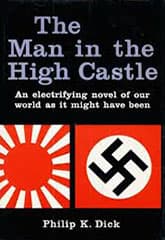The Man in the High Castle
Critique • Quotes • At the movies
 First edition
First editionFirst publication
1962
Literary form
Novel
Genres
Science fiction, alternative history
Writing language
English
Author's country
United States
Length
Approx. 90,000 words

Two Americans, one a ruling Nazi and one a rebel, face off in TV's The Man in the High Castle.
The Reich stuff
The Man in the High Castle (2015–2019): Television series, 40 episodes, 45–70 minutes each; directors Daniel Percival (nine episodes), John Fawcett, and others; writers Frank Spotnitz (creator), Wesley Strick, Rob Williams, and others; featuring Alexa Davalos, Rufus Sewell, Rupert Evans, Cary-Hiroyuki Tagawa, Luke Kleintank, DJ Qualls, Joel de la Fuente, Quinn Lord
The most intriguing characters in the television adaptation of Philip K. Dick's alternative history novel, The Man in the High Castle, are representatives of the Nazi German and imperialist Japanese overlords of America.
For some critics this is part of the miniseries whitewashing the most evil forces of real history, the fascist, racist and imperialist Axis powers of the Second World War. It doesn't help that those two characters in the show are so intriguingly portrayed by British actor Rufus Sewell and Japanese-American-Russian actor Cary-Hiroyuki Tagawa.
Tagawa, known for his villainous roles in Hollywood going back to the 1980s, is particularly affecting. He's the Japanese trade minister overseeing the occupied Pacific coast of the United States after the Axis victory in the Second World War. But in his story, vastly expanded from the novel, he is revealed to be a spiritual soul who regrets his past actions and fears his country's plans.
Sewell's character John Smith—made up for the series as far as I can see—is a former American soldier who opportunistically switched sides and became a high-ranking leader in the Nazi forces ruling the eastern states. He and his social climbing wife suffer a setback when the life of their son (Canadian actor Quinn Lord) is threatened by their government's eugenics program. However, Smith eventually sets aside any qualms he may have about the system he has become part of and claws his way to its pinnacle of power.
These conflicted characters are not the only ones to benefit from the adaptation of the novel into a more extensive form. More screen time is actually given to characters in the scattered resistance. Chief among them is San Francisco native Juliana Crain, who pretends to collaborate with both the Japanese and the Nazis, and tracks down films that show the Allies won the war and other variations on the outcome of that conflict.
Trailer for the miniseries of Philip K. Dick's The Man in the High Castle.
Much of Juliana's time though is spent in sorting out relationships with others supposedly on her own side—her Jewish boyfriend Frank Frink (ex-husband in the book), attractive double-agent Joe Blake (another created character), and a multitude of other figures (some adapted from the novel, some new) who come and go.
Dick fans may bemoan this reimagining of the story with all these additional characters and subplots, but they're necessary to stretch the slender novel into a four-season series. The television-friendly material—the romances, espionage, gunfights and cliffhangers—verges on the mundane compared to the novelist's compressed and more intellectually stimulating story, but it doesn't entirely kill off his idea-driven narrative.
An interesting aspect of the original text is the open-endedness of Dick's hints that history is not what we thought it was. We never get a final explanation of the films, of characters' mystical experiences of a different reality, or of a novel-within-the-novel depicting a different postwar outcome. We're left to puzzle it out the mysteries for ourselves.
The show's creators, however, cannot resist solving them—at least partially—for us and by the end of the series commit fully to the idea of parallel universes. Yet the ending is still somewhat ambiguous and has led to much comment, both positive and negative.
But the conclusion—like the entire production—is about as good as we can expect from the adaptation of a Dick story into a lengthy television series.
— Eric

